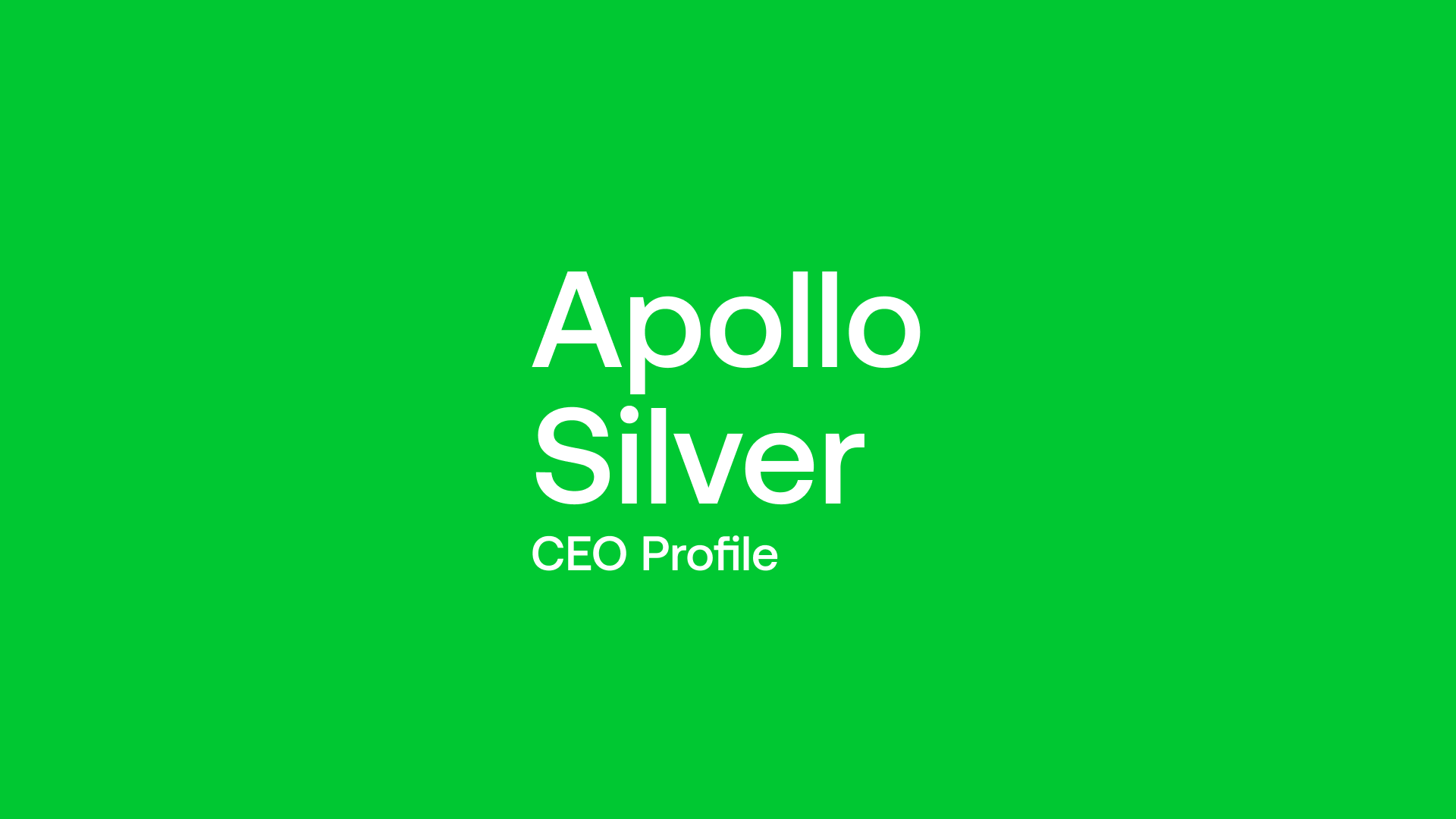Apollo Silver - CEO Profile

Learn more about the CEO of Apollo Silver.
About Apollo Silver
Apollo Silver Corp. (Apollo) is a pure-play silver exploration and development company focused on advancing its portfolio of US-based assets. The company’s flagship project is the Calico Silver Project (Calico) located in mining-friendly San Bernardino County, California.
The project hosts an inferred mineral resource estimate of 166 million ounces of silver contained in 58.1 million tonnes at an average grade of 89 grams per tonne silver. Apollo’s portfolio also includes the Arizona Silver District Project in La Paz County, Arizona.
The project hosts three significant epithermal veins with a collective strike length of 13 kilometres. These historically produced a reported 1.5 million ounces of silver intermittently between 1883 and 1930.
Read the full Company Note here.
Interview with Tom Peregoodoff, President & CEO of Apollo Silver
What's your company, title, and role? And for how long?
Apollo Silver Corp. and I've been President and CEO since 2021.
What have you been charged with doing for the company?
Creating value through the exploration and development of silver assets in the US.
What characteristics do you think one needs to be a CEO?
The ability to be decisive in the face of ambiguity. A lack of decisiveness often leads to a lack of direction which is far more damaging to an organisation. Bad decisions can be unwound.
To communicate a vision. You have to be able to paint a picture of what the future looks like, and how your plan will deliver on that future. This gives the team direction, shareholders and markets the means to measure success and stakeholders the ability to understand where you are going and ensure their concerns are incorporated into the plan.
You should be flexible. The best plan will always be impacted by external forces that will require adaptation.
And have integrity. Do what you say you will do, reliably. Deliver on commitments, and when you can not, don’t come up with a bunch of excuses, own the issue, and tell stakeholders how you are going to fix the issue.
What has/have your position as CEO taught you: good and bad.
Who you work with is as much or more important than what you work at. I have been in situations where regardless of the strength of the project, the team dynamic was such that much time and capital was wasted. As I always say, a good team will identify a bad project quickly and move on. A bad team will kill a good project.
Put the ego aside. If as a leader you have to be the person with the right answer all of the time, people will stop giving you input and inevitably they will leave and you will fail.
What’s the one thing that a mentor / boss taught you that you still think about / use today?
The concept of authority and accountability. This simple concept is so useful. This concept forms the heart of any leadership model.
You have to understand what you are accountable for, and within that framework ensure you have the authority make decisions that will deliver on those accountabilities.
The worse thing you can do is to split these two, hold a person accountable for delivering an outcome but failing to give them the authority to make all the decisions necessary to deliver. It destroys their moral and they will leave. The concept also forms the backbone on performance management.
If you get this right, performance decisions become quite easy as all parties know who is accountable for what.
In a sector known for its ups and downs, what’s the hardest decision you had to make?
Any decision involving people's futures is tough. A number of years ago BHP restructured its exploration group. An outcome of this was that the office where I started my career, where I had a number of close professional and personal relations was to be closed. It was my job to deliver that message to all those people.
Making the decision to close that office was tough. Executing it was probably the worst week of my professional career.
What are you most proud of?
Anytime I can mentor a young professional are the moments I feel proudest. I benefitted tremendously from the mentoring of 2 people and I know the importance and impact this can have. I try and return the favour to the next generation whenever I can.
Tell us something that few people know about you?
I get tremendous satisfaction from growing vegetables. I love sharing a table of homegrown vegetables with family and friends.
What does the future of this sector look like? What needs to change to get there?
One where the much larger role we play in the economic development and the advancement of society is embraced and recognised more broadly. And one where innovation, for example big data, automation, robotics, are key aspects of the mine of the future.
What is driving the need to change?
Societies' expectations around ESG which is driving investors expectations. And the need for mining to contribute to the solution. Without significant step changes in our efficiencies there is simply no way we will be able to deliver the raw inputs require: copper, lithium, nickel etc. We have to innovate.
What type of people are / should be attracted to this sector?
The sector is broad. At the front end, earth sciences have always attracted people who are curious, adventurous, value scientific discourse, and I don’t think that will change. More generally, people who like to disrupt, people who thrive on innovation, should look at this industry because that is where we have to go.
Which companies or individuals do you look up to?
I am still proud to say that I worked for BHP. They have had some issues, the obvious one being the Samarco dam disaster. I know many of the people that had direct involvement with that and I can say with out a doubt that they were impacted deeply. However the organisation is moving forward in a way that is consistent with their values and in a manner that society expects.
A colleague and friend at BHP once said “having a fatality on your site is the worst situation a leader can deal with. But in time, you will be judged not by the incident, but by how you lead through the incident.” I still live by those words.
I do admire Sir Andrew MacKenzie. He led BHP at the time of the dam failure and having worked with him at BHP I know how much this would have impacted him personally. He is a leader who has a deep regard for the science, a member of the Royal Society and somebody who has a very strong sense of values that he uses to lead.
What is your educational background?
I have a degree in Geophysics from the University of Calgary.
Did you know what industry you wanted to work in straightaway? What did you want to do?
No. I grew up in Calgary and was son of a very accomplished Petrophysical Engineer in the oil patch. I thought I was destined to go into the oil industry and in fact did work for a number of years through university at Shells Calgary Research Center as a Geochem lab tech.
In my last year of school, I worked the summer in the geophysics group with a large oil company and that experience showed me that I was not destined to work behind a desk, and was a big part of my decision to go into mining geophysics and minerals as opposed to petroleum.
What is your professional background?
I have spent the majority of my career in the exploration and early development stage of the mining pipeline. I have worked across a very broad suite of commodities and jurisdictions. As I advanced I had the opportunity to get more involved in resource delineation and early engineering studies.
I also spent some time in the commercial end, specifically with the diamond group within BHP and got great exposure to M&A concepts, JV’s etc. Leaving BHP gave me the chance to work with and learn from Robert Friedland and gain experience with the capital market side of the business.
When did you move into management? When did you move into a board position?
As my career advanced I started managing technical teams but my first more general management role was when I was appointed Manager of Falcon Operations within BHP in 2002. Falcon was an in-house airborne geophysical group that was established to operate and commercialise it's in-house gravity gradiometer technology that it developed. It was a fun role in a high-profile group and was my first exposure to the broader skills required to lead a diverse team.
I first got involved in external boards in 2012 and since then have sat on a number of boards of public and private companies as well as not for profit organisations. Different boards require different skills and I like the diversity of experiences. I like to keep learning.
What do you think your best attributes are for running a company?
Solid reputation in the industry and in the capital markets.
Good communicator and can cut to the chase.
Decisive.
Broad experience which allows me to ask the right questions.
And knowing I am not the smartest man in the room!
What kind of people do you surround yourself with?
People smarter than me!
I try and be honest with myself, about the things I am good at, but more importantly the things I am not good at, and ensure that the people I hire excel in those the aspects of this work that I don’t excel in or really enjoy.
People with the right attitude. It is so much more important than experience in my view. I can teach skills and support with my experience or find a mentor for somebody. I can not teach attitude.
What are the KPIs that you focus on for yourself and for your team?
The board has set a number of KPI’s for me which I then trickle down to my team. Broadly they are:
- Strategy – Set and communicate a strategy. Use this to set objectives and report against delivery against objectives.
- Execution – Ensure allocation of resources aligned with agreed strategic objectives. Develop a culture of accountability and excellence in delivery.
- People – Provide leadership with a high degree of integrity. Match people's requirements to objectives. Set a culture of high performance.
- Stakeholder Engagement – develop and maintain effective working relations with all external stakeholders. Ensure investors have the information they need to make informed decisions.
Shareholders are nervous with current market conditions. How do you maintain confidence for current shareholders, and attract new potential investors?
Deliver. You have to deliver, regularly and reliably. I can not control the market but I can control how we are creating value through advancing our assets.
Re-iterate the vision. Need to remind current and new investors of the value proposition that they engaged with before the markets current re-set, and explain the value you have added since then.
Get the message out which is now a big focus of mine given that the summer season is drawing to a close and investors are returning to their desks.
What do you think are the challenges currently facing the mining industry?
How we deliver the resources that are going to be required by all of the GHG emissions targets that are being set and do it in a way that stakeholders see as responsible and consistent with the broader goals of sustainability.
Combating the apparent “drive to nationalise” and ensuring that those countries that are moving left understand the tremendous contributions that a thriving resource industry makes.
People issue. We have to show new generations that we are not your grandfather's mining industry. That we are dynamic, forward thinking and technologically advancing. We have to show young people that we are part of the solution and that they can contribute to the solution through working within the industry.
Final question, what do you want investors to think of when they hear your name?
Sound, trustworthy, and high integrity.
Analyst's Notes




Subscribe to Our Channel
Stay Informed


















